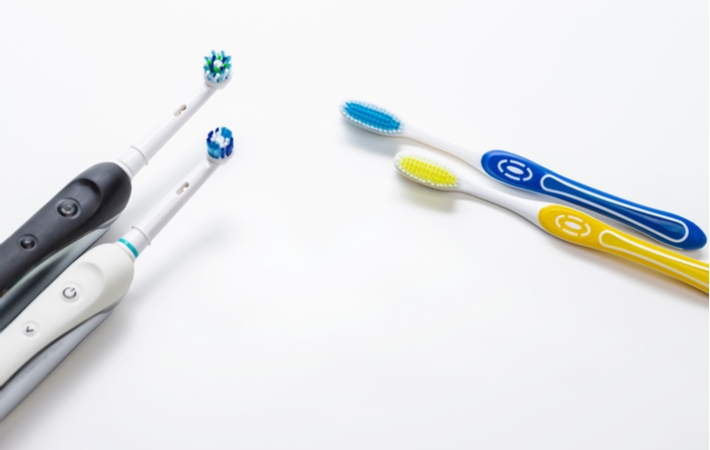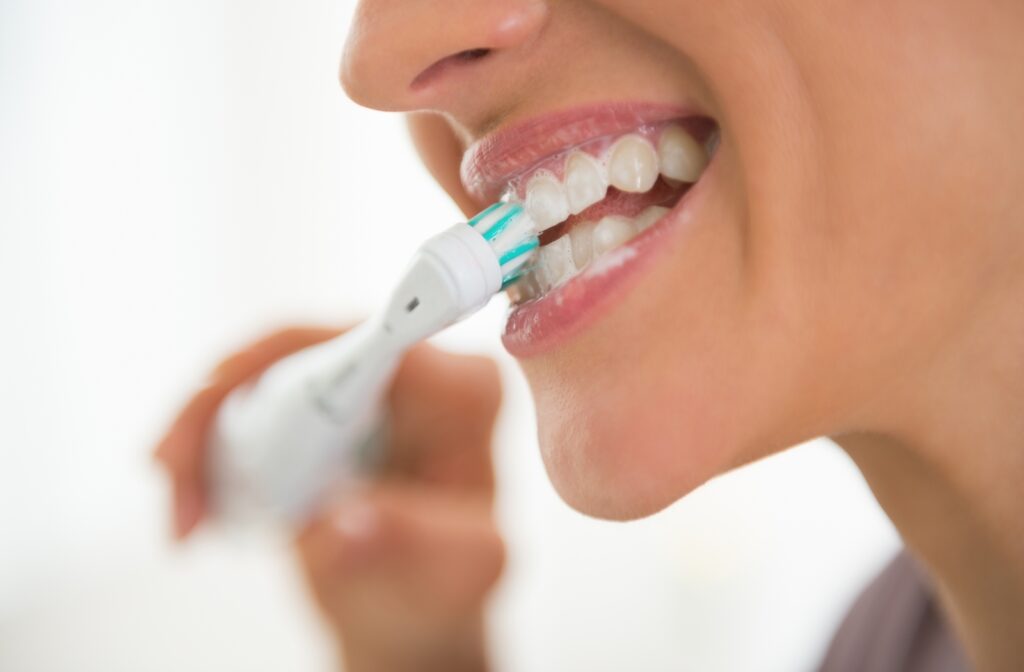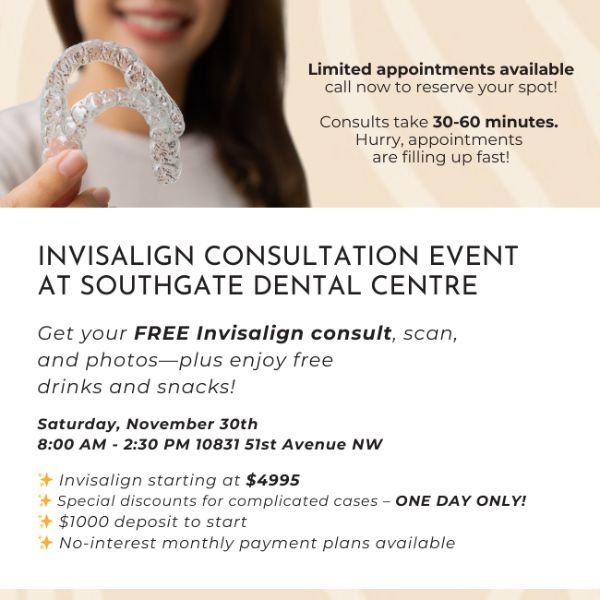Picking an Electric Toothbrush
Visiting your dentist for routine dental exams and cleanings is crucial for preventing and treating oral health problems. However, your everyday dental care also plays a significant role. Caring for your teeth and gums at home takes many forms, but the best-known practice is probably brushing your teeth.
Toothbrushes are available in a range of types, including manual and electric. Both have their advantages and disadvantages. Picking the best toothbrush can help you avoid dental problems, like dental bleeding or gum recession. So are electric toothbrushes better for cleaning teeth, or can they cause gum recession?
What Is Gum Recession?
Teeth are made of the strongest materials in your body, particularly the outer layer of teeth (enamel). While they help you chew, grind, and rip food, teeth also help you speak clearly. However, your teeth can’t do it all alone. They need the support of healthy oral tissue, including your gums.
Gums should fit closely around the anatomical crown (top part of the tooth). Healthy gums are pink, firm, and don’t bleed easily, even when flossing. However, occasional bleeding can occur, even in healthy gums, if you use a hard-bristled brush or “snap” your dental floss against your gums.
Receding gums (gingival recession) occurs due to periodontitis, a severe stage of gum disease or trauma that can be caused by toothbrush abrasion. Recession whether due to infection or trauma exposes the root surfaces, which are softer and more prone to decay. As a result, your gums can’t effectively support the teeth and bacteria can get trapped in the growing gaps.
Gum recession also increases the risk of infection and can lead to tooth loss. Symptoms of receding gums due to infection typically include:
- Bad breath
- Bleeding gums
- Exposed roots
- Gum swelling or pain
- Loose teeth
- Visibly shrinking gums
Symptoms of trauma from toothbrush abrasion typically include:
- Root wear
- Root decay
- Exposed roots
- Tooth sensitivity
What Causes Gum Recession?
Gum recession is most commonly a result of gum disease, a dental problem affecting 70% of Canadians. Preventing plaque is crucial for preventing gum disease and dental issues.
Plaque is a clear, sticky substance containing bacteria that forms on teeth. Daily brushing and flossing can remove most plaque, but sometimes excess plaque remains, hardening into dental tartar (calculus). Only a dental professional can remove tartar. Over time, the bacteria inside tartar damage the gums, leading to gum disease.
Other common causes of gum recession include:
- Toothbrush abrasion
- Diabetes
- Hormonal changes
- Smoking
Most additional causes of gum recession also increase your risk of developing gum disease. Sometimes, it can be a “chicken or egg” situation, where it’s unclear which came first. Preventing gum disease and practicing healthy oral habits are crucial for maintaining healthy gums.

Electric vs. Manual Toothbrush
Both electric and manual toothbrushes can remove plaque to help prevent gum disease. However, electric toothbrushes have an advantage, as micro-movements are more effective than manual movements. Notably, rotating electric toothbrushes and vibrating electric brushes are better at removing plaque than manual toothbrushes.
Electric toothbrushes are generally considered safer for gums. In addition, soft bristles are recommended over hard bristles, regardless of toothbrush type. As aggressive brushing can lead to gum recession, an electric toothbrush with better, soft bristles can be superior for gum health.
People using manual toothbrushes are more likely to brush too hard. With a manual toothbrush. you may feel you have to apply more pressure or use broader, horizontal strokes to remove plaque. An electric toothbrush can encourage gentler pressure and more careful, smaller motions.
Electric Toothbrush: Pros & Cons
Electric toothbrush advantages include:
- A rotating motion for effective plaque removal
- Broad availability of various brush head sizes and types
- Built-in timers to ensure you brush for at least 2 minutes
- Built-in pressure warning
- Easier for handicapped to use due to less movement
Some disadvantages include:
- More mess as the motions tends to spread saliva and toothpaste
- Higher cost (compared to manual toothbrushes)
- Requires electricity or batteries to operate
Can Electric Toothbrushes Prevent Gum Recession?
Rotating electric toothbrushes with soft bristles can be better for removing plaque without harming your gums. But a manual toothbrush with soft bristles may be better for your unique dental care needs.
Some people don’t like the feeling of an electric toothbrush. Therefore, you might be more motivated to brush consistently with a manual toothbrush. Whichever toothbrush type you prefer, consistently brushing with proper technique is essential for preventing gum recession.
It’s also crucial to remember that neither an electric nor manual toothbrush can replace flossing. Toothbrushes effectively remove buildup on teeth’ front and back surfaces but can’t easily reach between. Brushing harder or pushing bristles between teeth isn’t the same as flossing.
Knowing how much pressure is enough can be challenging, particularly with manual toothbrushes. Talk to your dentist about your brushing routine or ask for a demonstration for a pressure reference.
Discuss Toothbrushes with Your Dentist
There are a lot of toothbrush options. Discuss your toothbrush choice with your dentist or dental hygienist. While your dental hygienist will provide a recommended manual toothbrush at your next dental exam and cleaning, you’re welcome to ask about electric options! We can make a recommendation based on your personalized oral health needs.
Request an appointment at Southgate Dental Centre today to discuss your dental care.



